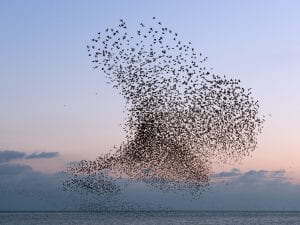CAW Postgraduate member, Becca Oliver (MA Creative Writing) shares a recent interview with poet John McCullough
“Picture it now so you’ll remember the scene one lonely midnight when your heart assaults your ribs: the galactic light of tiny selves
that never wanted anything like this but together, finished up terrified, magnificent, brightly living the only way they know.”
– Electric Blue from Panic Response by John McCullough
Hawthorn Prize winning and Costa Poetry Award nominated poet John McCullough recently released his new book Panic Response, a collection of poems which explores personal and cultural anxiety through John’s trademark punchy, experimental style. I was lucky enough to get a chance to ask John some questions about Panic Response, and about how his wellbeing and his queer identity interacts with his writing.
Becca: You have obviously reached a point where writing is an occupation as well as a hobby. How do you ensure that writing remains a well-being practise despite this?
John: I think there’s always been something especially cathartic for me in the early stages of writing. The only difference between now and when I first started out is that I then shape the language of that first draft in order to give the poem the best chance of creating an emotional response in someone who doesn’t know me. I want to move them, which means I have to craft the sentences carefully. Connecting with other humans on a deep level is what gives me the greatest satisfaction as a writer.
Becca: Often there is a particular view of poetry as a medium dense with sadness and deeply personal writing. Do you think that a poem must cut deep in order to be therapeutic for the writer/reader?
John: Certainly a number of the poems I write are of that type. I’ve also always written love poems and other happy ones too. I think joyful poems can be helpful in a different way to both writers and readers. I know that when I’m feeling blue, I often turn to poets like Frank O’Hara who are generally quite cheerful and energetic and give me a boost. There’s something radical about happiness in the face of adversity, and if I can ever bring delight to someone feeling low then that’s a wonderful thing.
Becca: The raison d’etre of this blog is to encourage creative expression in order to foster wellbeing, particularly for queer people. As a queer writer yourself, tell us about how that aspect of your identity is important to your writing.
John: ‘Queer’ has always been an important word to me. I like how inclusive it is, and how it captures the way sexuality and gender affect an individual’s experience of the world more broadly, seeping into other places. I think I use a lot of surreal imagery partly because, as someone queer, I’ve frequently seen the world from an angle different to the majority of folk around me. Like a lot of LGBT+ residents, I moved to Brighton as something of an exile, as someone who hadn’t really fitted in elsewhere. In Reckless Paper Birds, I write quite a lot about encounters with prejudice and it was really important to have expressions of defiance in there too. Many of the poems in that book are about solidarity between queer people and how we create our own subcultures and communities.
Becca: Your new collection Panic Response has been described as your “darkest and most experimental yet.” Do you think that taking an experimental approach to dark and difficult subject matter makes darkness somehow easier to navigate?
John: I’ve definitely found it helpful. In my early books, I avoided writing about trauma and the struggle I’ve had with mental health issues mostly because I found it too painful to stay on that topic. Coming at anxiety and experiences like breakdowns and burnout using experimental approaches to form makes it a little less overwhelming for me. It keeps my brain preoccupied with the challenge of building the structure and ensuring that it channels emotion to the reader.
Becca: Does the therapeutic nature of writing end with the initial freewrite, or is there equal catharsis to be found in the more clinical practises of editing etc?
John: I think freewriting has usually been the most therapeutic aspect for me mostly because at that stage I can put down any- and everything on paper. I’m not yet worrying about crafting a structure so all kinds of imagery and phrasing can pass through me. When I’m editing, I’m very much concentrating on how the reader receives my words so I often cut or adjust many lines that wouldn’t make sense to someone else. I do enjoy editing, though. There’s something highly satisfying when you know you’ve strengthened a phrase or sentence so that it has more impact.
I also asked John to provide our prompt for today:
Freewrite about a colour that inspires strong feelings in you (positive or negative). Reread your freewrite and underline the phrases with the most energy, then use these phrases to shape a poem.
Perhaps you can take some inspiration from this photo of John’s colourful bookshelf which he was kind enough to share with us!

Remember to share your responses to the prompts to #UOBQueerWellbeing hashtag on Instagram and Twitter, and to check out John’s new collection which is available directly from his publisher Penned in the Margins (and most other places that sell good books!)
Check out Becca Oliver on Twitter and Instagram:
Twitter: beccafang
Instagram: becca.fang




